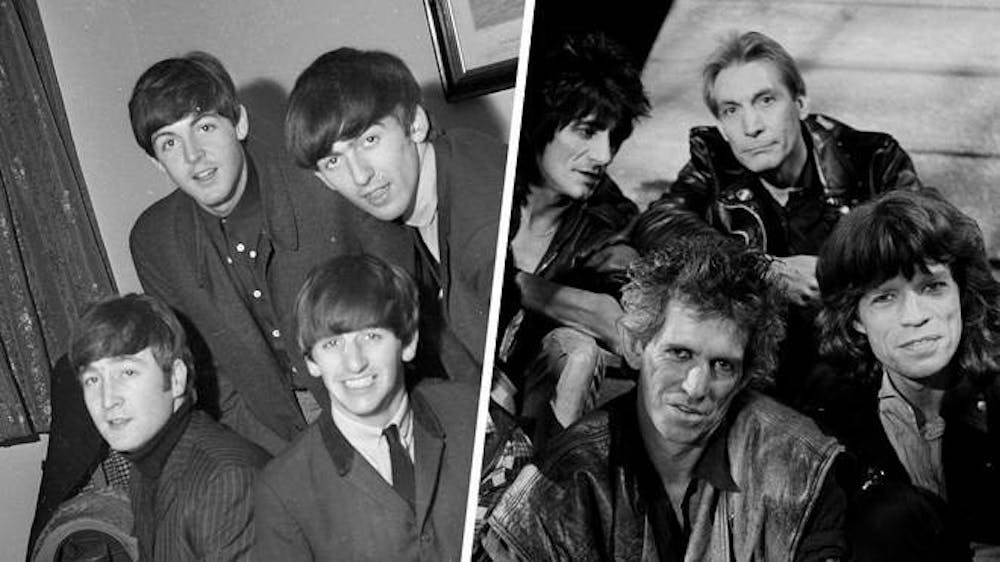In a recent interview with David Remnick from the New Yorker, former Beatles frontman, Paul McCartney made the following comment: “I’m not sure I should say it, but they’re a blues cover band, that’s sort of what the Stones are. I think our net was cast a bit wider than theirs.” This statement follows a decades-long feud that has been given new fuel. Was the relationship between these two bands always rooted in competition? Or was this an imagined conflict forced into existence by the media and polarized fans?
The bands first met April 14, 1963, following the Stones’ show in Richmond at the Crawdaddy Club, at which point the Stones were actually a blues cover band. It was this meeting that motivated Beatles guitarist George Harrison to personally recommend the Rolling Stones to Decca Records despite the label having passed on the Beatles. At a Beat Group talent show, Harrison spoke to the president of Decca Records, Dick Rowe, about a band he had just gotten to see, a group he claimed was better than any of the talent at the competition. A few weeks later, the Stones signed with Decca Records.
In the same year, John Lennon and Paul McCartney ran into Andrew Loog Oldham, the Stones’ manager and producer. Upon learning that the Stones were in the recording studio, Lennon and McCartney headed over and turned a verse into the second single the Stones ever released and a song that would reach No. 12 in the UK: “I Wanna Be Your Man.”
Interestingly, in 1963, the Beatles released another version of “I Wanna Be Your Man,” but instead with Ringo on lead vocals. In David Sheff’s “All We Are Saying: The Last Major Interview with John Lennon and Yoko Ono” and an interview with Playboy, Lennon claimed, “It was a throwaway. The only two versions of the song were Ringo and the Rolling Stones. That shows how much importance we put on it: We weren't going to give them anything great, right?”
The two bands featured each other on their 1967 album cover art: “Sgt. Pepper’s Lonely Hearts Club Band'' and “Their Satantic Majesties Request.” In spite of this olive branch act, three years later, Lennon stated in a Rolling Stones interview, “Every f-ckin’ thing we did, Mick does exactly the same — he imitates us.” He goes on to claim that Stones song “We Love You” is just a rebranding of the Beatles’ “All You Need Is Love.”
Even the Beatles’ music carried a hint of this feud, notably in the two John Lennon songs “And Your Bird Can Sing” and “Dig a Pony.” As for the former, although many debate the origins of the song, some cite that it was written for Mick Jagger and the Rolling Stones. Jagger’s ex-girlfriend at the time, Marianne Faithful claimed in Steve Turner’s “A Hard Day’s Write: The Stories Behind Every Beatles Song” that she was the “bird” Lennon was writing about. The latter seems to have a more obvious pointed attack of the Stones with the following line: “I roll a stoney / Well, you can imitate everyone you know.”
Even Mick Jagger joined the feud in a 1987 interview with Q Magazine: “I mean, when the Beatles broke up, I couldn’t give a shit. Thought it was a very good idea.” Eight years later, he asserted that it was McCartney’s and Lennon’s strong personalities that broke up the Beatles.
In a 2015 interview with Esquire, Stones guitarist Keith Richards claimed that the Sgt. Pepper’s album was not worth the hype: “Some people think it's a genius album, but I think it's a mishmash of rubbish, kind of like Satanic Majesties— ‘Oh, if you can make a load of shit, so can we.’” He went on to say in a Radio Times interview a year later that “Musically, the Beatles had a lovely sound, great songs, but the live thing? They were never quite there.”
In spite of comments like this, McCartney pushed against the Stones conflict in 2020 with the following quotation: “We were all so excited that we were down in London and we all got recording contracts … so there wasn’t like any animosity. There is a rivalry but it isn’t a bad one.”
Based on the evidence, it seems that for much of its history, the conflict has been a rather one-sided debate: the Beatles continuing challenging the Rolling Stones and their pervasive influence while the Stones respond with jokes. Clearly, some of the members of the Stones, most notably Richards and Jagger, have involved themselves just by curtailing the comments made by Lennon and McCartney. We will have to wait and see what new conflicts emerge.
Get The Chronicle straight to your inbox
Signup for our weekly newsletter. Cancel at any time.

